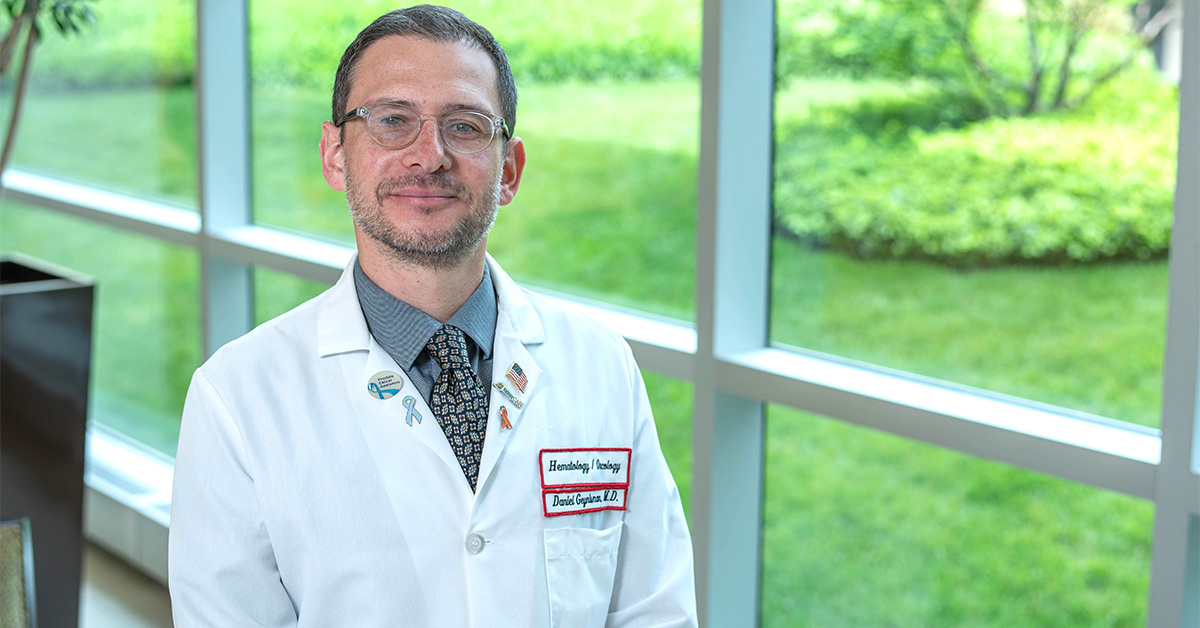
PHILADELPHIA (January 26, 2024) — Patients with muscle-invasive urothelial carcinoma who underwent surgery to remove their tumor appeared to have an overall survival benefit from subsequent systemic therapy with the immune checkpoint inhibitor nivolumab, according to an analysis by researchers at Fox Chase Cancer Center.
The new information was presented today at the 2024 ASCO Genitourinary Cancers Symposium, which is being held January 25-27 in San Francisco.
Although the majority of urothelial carcinomas — tumors that originate in the renal pelvis, ureter, bladder, or urethra — are not muscle-invasive, about one-quarter are muscle-invasive at diagnosis. Currently, radical cystectomy or nephroureterectomy — surgery to remove the bladder or kidney and ureter — are the standard of care for patients with muscle-invasive urothelial carcinoma.
“The goal of adjuvant therapy is to prolong a patient’s disease-free survival and, ideally, improve their overall survival,” said Daniel M. Geynisman, MD, Chief of the Division of Genitourinary Medical Oncology at Fox Chase.
The previously published CheckMate-274 trial randomly assigned patients with muscle-invasive urothelial carcinoma to adjuvant nivolumab, also known by its brand name Opdivo, or placebo and showed that nivolumab significantly prolonged disease-free survival. However, data on whether or not nivolumab prolongs overall survival are not yet mature and are unavailable.
In lieu of overall survival data, Geynisman recently presented the results of an analysis that attempted to estimate how many patients with high-risk muscle-invasive urothelial carcinoma who undergo radical cystectomy could be cured with adjuvant nivolumab. “Cure” was defined as being alive and free of disease recurrence at five years.
“Disease recurrence after five years in urothelial carcinoma is rare; almost all recurrences occur within the first five years,” Geynisman said. “In the absence of randomized clinical trial data that show if there is an overall survival benefit for adjuvant therapy, we tried to estimate the benefit of adjuvant nivolumab as it relates to long-term cure.”
Geynisman and colleagues used a mathematical model called mixture cure models to estimate survival curves for patients assigned to nivolumab or placebo who were considered “cured” or “not cured.” Disease-free survival for the cured subgroup in each arm was estimated using background mortality rates published by the World Health Organization. The disease-free survival for the uncured subgroup in each arm was obtained via mixture cure models along with the cure fractions using the reported disease-free survival data for each arm from CheckMate-274.
Among the entire study population, the model estimated a 6% to 9% absolute increase in the cure rates when patients were treated with adjuvant nivolumab compared with placebo. Between 43% and 45% of patients treated with nivolumab were cured compared with 36% to 37% of patients assigned to placebo.
Geynisman and his colleagues also looked at the population of patients with higher expression levels of PD-L1, a marker targeted by nivolumab. Among this group, there was a 23% to 25% absolute increase in cure rate with nivolumab compared with placebo. Between 59% and 61% of patients treated with nivolumab were cured compared with 36% to 37% of patients assigned to placebo.
“Practically speaking, when physicians are talking to patients about whether or not to treat their urothelial carcinoma with adjuvant nivolumab, this is another piece of evidence to support doing so,” Geynisman said. “Although we don’t have mature overall survival data from the trial, this model seems to support an overall survival benefit associated with adjuvant nivolumab.”
The study, “Estimating the Impact of Adjuvant Treatment With Nivolumab On Long-Term Survivorship Rates Compared With Surveillance: Analyses of Disease-Free Survival (DFS) From the Phase 3 CheckMate-274 Trial,” was presented during a panel discussion during the meeting.